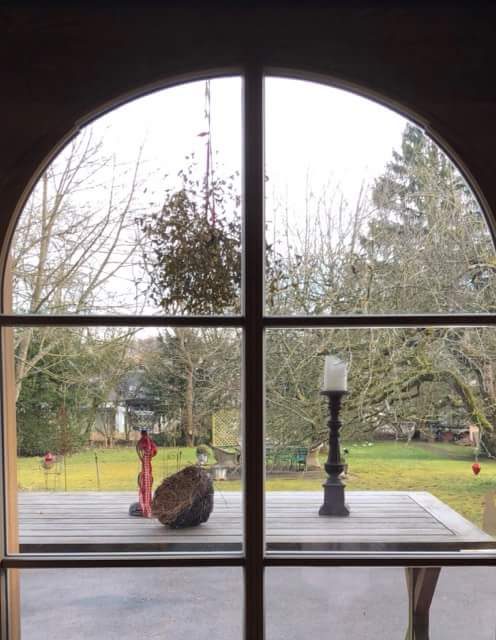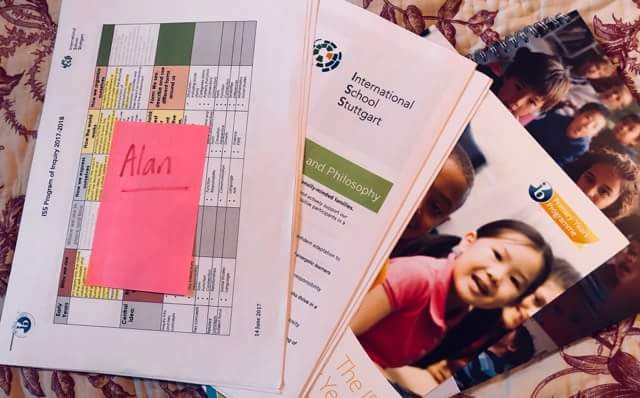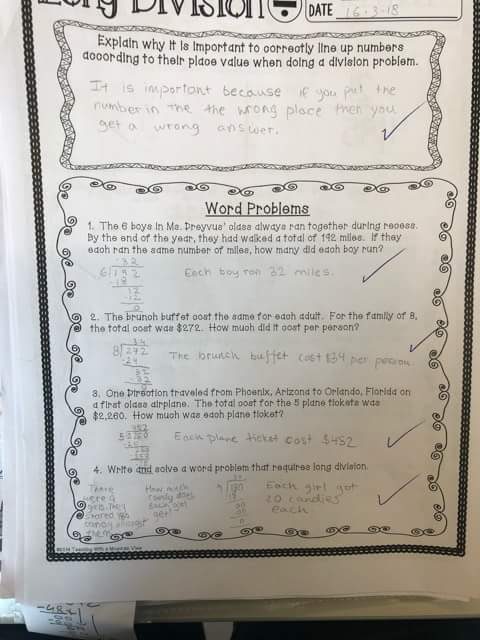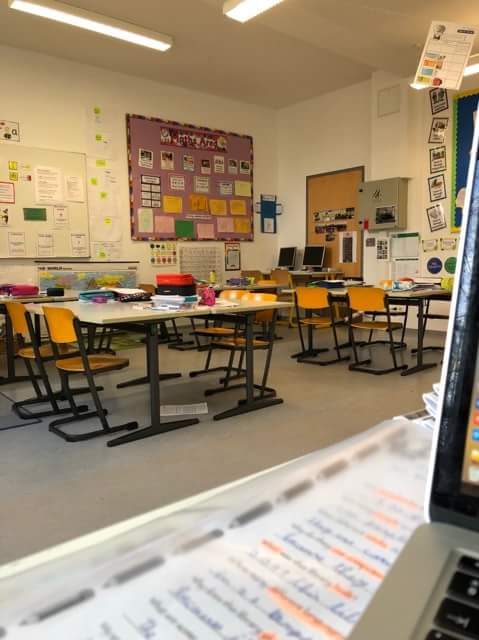In such a short space of time, so much has happened.
My first week in Stuttgart has come to an end, and I foresee that the rest of my time here will be just as insightful as this week has been; brimming with multiple points for reflection and development.
Even before I started my work at ISS, I was expanding my knowledge of both the culture of Germany and the language of German, with great assistance from the host family who have welcomed me with open arms. During my stay, I will be working with the family’s youngest son in order to improve his English skills, which will both improve his language skills, due to the exposure to a mother tongue speaker, but also enhance my teaching practice as I will need to work one-to-one with the child to respond to his particular needs in terms of enhancing his English as an additional language skills. Even just day-to-day conversations will no doubt have great impact on the progress of his English knowledge. These skills will no doubt be beneficial when I return to Scottish education, as there will be students that do not speak perfect English at some point in my professional career (which I had last year during 1PP1). This experience will allow me to utilise various professional skills, with setting professional goals being a core area, as I will need to set out goals for both the child and me to progress cohesively.

The view of the garden from where I will be writing most of my blog posts.
My first introduction to Stuttgart was with the family that provided a massive culture shock. My first full day consisted of portfolio planning that was surrounded by the on-goings of George Michael’s “Older” album playing over speakers, to then change into the likes of Debussy and Bach, as the German news was playing in the next room. Alongside this during the first evening meal, the family was communicating across the dinner table in French, German and English, with conversations flowing with ease across the triad of linguistic frameworks that somehow worked seamlessly, as if it was meant for the languages to be experienced together. Opening oneself to different languages and cultures can bring great benefits in my opinion, as this family is proof of it: their children are well above their expected grade levels for their ages and they have gained the necessary skills to examine more languages. The freedom to be able to express oneself in any given language is something that I envy, I wish that much of the UK’s culture and societal view upon language as a whole would be more open to going beyond relying on English as their go-to language (even in countries that do not speak English as a first language). Particularly, when we view it in an educational lens, as the 1+2 scheme in Scotland hopes to fix this issue. However, I believe we need to unpick the societal problem that has a bigger lasting impact on our perception of language as a whole.
However, I must examine my work that I conducted during the first full week at ISS, the International School of Stuttgart, also. For this week, I worked with a grade 4 class, whose teacher has a rich background in working within International schools. This served as a great basis for me to get to understand the IB PYP (International Baccalaureate Primary Years Program). In short, the predominant feature of PYP is that the children are heavily involved in their own inquiry-based learning. A key feature in the timetable is a specific slot time for the children’s unit of inquiry, which is a core area within IB.
Furthermore, The teachers plan collaboratively for their whole year of teaching in terms of the specific areas within a subject through an application called Rubicon Atlas, with the example of mathematics being shown here:

The whole grade’s plan for the teaching of mathematics depending on the time frame
They also use a portal known as Veracross to take attendance, track students progress in learning, and make themselves aware of any allergies or health points that a teacher needs to know. This is to coincide with the platform of Atlas.
“Central to the philosophy of the PYP is the principle that purposeful, structured inquiry is a powerful vehicle for learning that promotes meaning and understanding, and challenges students to engage with significant ideas.” (ISS, 2017, pg.5).
Much of the learning within ISS is facilitated through a constructivist approach towards learning, wherein that students will focus on building their learning themselves alongside support from practitioners that will guide them towards the correct avenues of learning, thus the inquiry-based approach is utilised. Within this, topics such as stereotypes, Internet safety, and societal issues coincide with the learning required in research skills – how do I go about making this project? How do I find appropriate sources? How will I know they are appropriate? Why is this important? These are but a few questions that arise with students within their inquiry that is focused towards a particular interest within the child.

The paperwork that I will be familiarising myself with over the 8 week placement.
Within my specific class for this week, we worked through their unity of inquiry through collaborative groups, which were constructed across the entire grade. This meant that teachers were facilitating learning aids and prompts across various classrooms at one time with students working with different mediums within their group, an approach I have never seen in practice until now. What I really gained from this work was that I was able to see that students really had a passion towards the learning that they were doing, it was learning for the joy of learning. I also witnessed some groups following the trends of Tuckman’s group theory of forming, storming, norming and performing (1965), which believed that people working within small groups that need to work towards similar goals, go through different stages of coming together, having conflict, working through conflicts and then going on to meet the aims of their tasks. This is particularly challenging for teachers. I had to work with a particular group that were disputing over the assigned roles within the team (which were required to bring their ideas together to create a presentation) and it was tricky to try and diffuse the situation somewhat, however, it was also even harder to not try and solve the problems myself, as the group dynamics were learning points for the students as well, which IB outlines is a core aspect of learning. This is a massive area for forming internationally-minded students, as people need to understand they will experience challenging group situations within life, and IB is preparing students for them. Furthermore, the types of collaborative projects have been very thought-provoking.

An example of the work I was doing with my class in mathematics – an emphasis on the actual “hows” and “whys” of mathematics rather than just knowing the answer is emphasised in the IB curriculum.
This particular unit of inquiry (UOI) was centred around the whole grade level being sectioned into groups to conduct tasks that interlink with the outcomes required in the IB curriculum around the topic of our lives being so heavily influenced by media in the global world. The central idea is concerned about our understanding that we are both producers and consumers in media-rich societies. Issues like phishing, cyber bullying, photoshop editing, continuing stereotypes through advertisement, social media’s impact on body image and self-esteem issues were split amongst the groups who were assigned different media outlets to express their findings and opinions on the topic. Skits, presentations, animations and news reports all have been created to highlight the precautions needed with media in the global world; we are all consumers of a consumerist world and must be forever mindful of that. Not only that, but we need to be safe online. These groups will come together to form a whole grade project of inquiry that has been predominately student-led. The grade 4s hope to bring together their findings as one informative assembly presentation that will showcase the inquiry they have done.
Also, due to the business being a school, I knew to expect the unexpected in terms of what can happen within a school day and week. However, I ended up being able to go on a school field trip on only my second day of being at ISS. The field trip was to the the Stadtbibliothek Stuttgart (the giant library in the centre of Stuttgart), which allowed me to see the centre of Stuttgart for a short while, also. This field trip was different from the ones I have experienced in Scotland where most of the transport is planned out, timings are crucial and the whole day is set out, with children having little freedom in the sense that they are always accounted for within a teacher’s schedule. Instead, we used public transport with the kids, we planned what we did with the children according to the plans of the tour (for example, we originally hoped to have a picnic lunch outside, however, were able to have lunch at the library itself instead due to it being cold). The kids even got some free play time outside the library before having to get the train back to school, which showed a more relaxed approach to trips with a large group of children, which gave me areas to reflect upon in terms of the health and safety obsessed approaches the majority of the UK maintains.

An example of one of the classrooms in ISS
I have also been able, in my time with the class, to work within small group lessons and conduct one short whole class lesson within mathematics (which, by following the Atlas, you can see that we are focusing on multiplication and division). I was tasked with exploring worded problems that emphasised the exploration of the hows and whys of mathematics. I took great confidence in leading this topic as there was one particular boy in the class that struggled with working with division, however, using the skills that I have gained in the STEM subject at the university from the likes of Eddie Valentine, I was able to break down particular areas that were tricky for the child (especially their understanding of place value) in a far more effective manner than I would have this time last year, which proves to me that I am already boosting in my confidence, particularly within mathematics.
I have also met with the Head teacher and we have mapped out my plans and aims for the placement: I will work my way down the grades, helping and aiding in classes and teaching in some, to experience the differences in the years across a school (4, 3, 2, 1, kindergarden). Then, when it is time for the huge project of the grade 5 exhibitions, I will assist in teaching and aiding the grade 5 students and teachers (something I will blog about more closer to the time!). Thus, concluding my placement with a wider scope of the whole process of learning that goes on in the primary stages of an IB school, but also get to know the school and staff members more whilst gaining experience teaching in an international school environment.
Beyond the school, I’ve been learning more about the culture of Germany and the German language. I’ve also been driving on the Autobahn to get to and from the school!
Looking ahead to the rest of placement, I hope to be able to take more control in terms of teaching points within the school, but also reach out more to the other staff members, as I have already received such a warm welcome from everyone at the school.
Reference:
ISS (2017) ISS PYP Handbook Degerloch: International School of Stuttgart
Tuckman, B. W. (1965). Developmental sequence in small groups. Psychological Bulletin, 63(6), 384-399.
